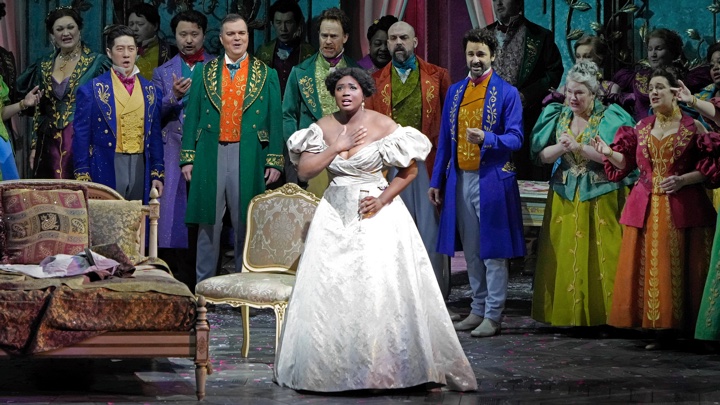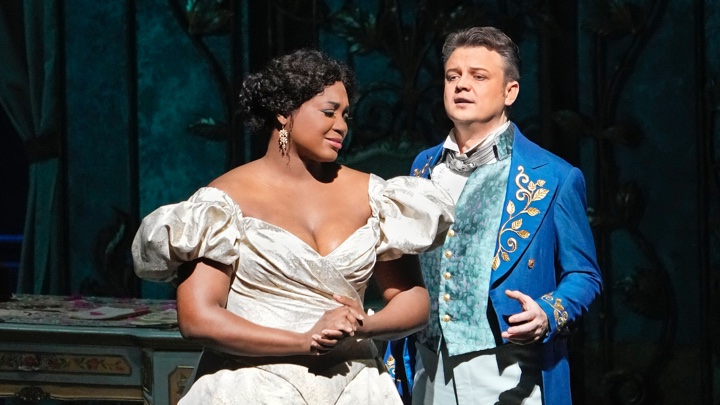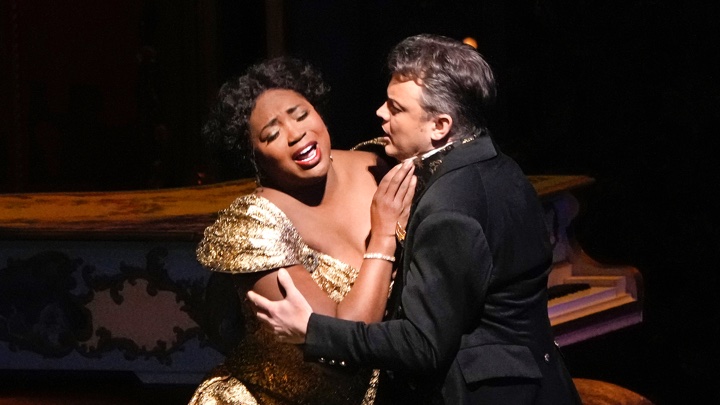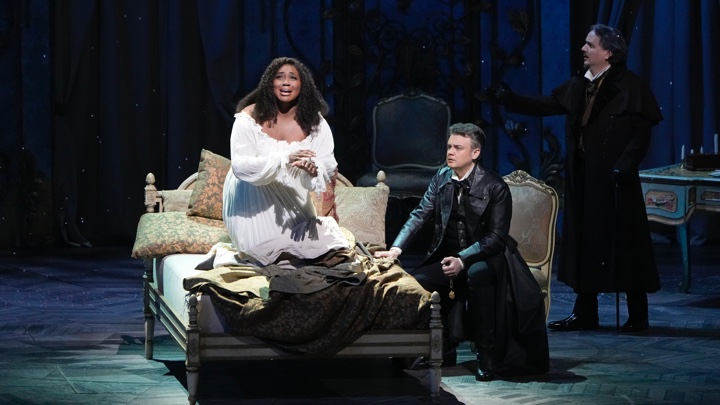

A talented new generation of African-American singers were showcased in that production including Will Liverman, Latonia Moore, Ryan Speedo Green and Angel Blue in the central roles.
Blue took over the role of Violetta in this season’s Met revival of Verdi’s La Traviata—the third of three fascinating courtesans encountering love and death in the Liberace meets Disney technicolor bordello of Michael Mayer’s distressingly vulgar production.
Blue’s other operatic assignments at the Met have included not only the multiple female roles in Fire Shut Up in My Bones but the titular role of Bess in Porgy and Bess and both Mimi and Musetta in La Bohème. Blue is this year’s winner of the prestigious Richard Tucker Award and has major Met contracts lined up in future seasons including the title role of Verdi’s Aïda in a new production by… Michael Mayer…
Usually by the third run of a revival in mid-season, you get a routinier house conductor and a patchy supporting cast. By that point rehearsal is minimal, the chorus and orchestra are usually on autopilot and the supporting singers walking through it. Seen at the second performance on March 7, things that may have been sloppy or approximate at this cast’s first show had fallen securely into place. Everybody was on.
Oddly, after a thorough review of the Met Archive Database, I cannot find any African-American soprano who has performed Violetta at the Metropolitan Opera. Unless anyone knows otherwise, I suspect Angel Blue is the first black Violetta at the Metropolitan Opera. (Pretty Yende is scoring successes worldwide as Traviata but hasn’t done the role in New York)
It is a role I think Blue may be outgrowing as a budding spinto—she not only has recently unveiled her Aïda in Detroit but has already done several Toscas and has the Trovatore Leonora on the books in the coming year.
Angel Blue sang her first Violetta in La Traviata at the Seattle Opera in 2017, repeating the role in the 2018-19 season for her debut at the Royal Opera House, Covent Garden. Miss Blue’s Violetta marked her return to the Teatro alla Scala in 2019 and at Houston Grand Opera in 2022. So she is an experienced interpreter of the touchstone diva role on international stages.
Violetta is a role that many experts have described as requiring a coloratura in the first act, a full lyric in the second act and a spinto-dramatic in the last act. Yet is a shock to see such historical heavyweights as Maria Caniglia and Gina Cigna as Violetta and the Met featured Rosa Ponselle and Renata Tebaldi as the courtesan. Blue, a lirico-spinto, is more along those lines and her refulgent, lush soprano blooms as Violetta’s vocal lines broaden and soar. Rich, full middle and especially low notes affirm her spinto credentials.
Statuesque, curvaceous and robust, Blue doesn’t present the frail neurasthenic creature Ermonela Jaho gave us in January. This is a hearty party girl who whoops while being swung around by male choristers. Launching into the “Gioir!” at the beginning of her first act double aria, Angel shimmies her shoulders and shakes her hips holding a champagne bottle aloft.
In Act I, Blue audibly lightens her voice but nevertheless there is a bit of “approximatura” going on and she doesn’t trill. However, the voice is gorgeous and the high notes are very there and easy. She ends “Sempre libera” on a sensible high A-flat. I was told by someone who was there that this first act was a better showing than her first show on Saturday afternoon March 4.
In Act II, Blue’s experience in the role shows as the voice sails over the arching lines of Verdi’s cantilena like liquid velvet. She hits her marks and makes her points with a knowing and assured interpretation of Violetta’s emotional conflicts. The phrasing is musical and poised. Blue digs deeper and goes for broke in Act III, coughing up such a storm one thinks she wouldn’t be able to float legato lines but she does so seamlessly. The dramatic declamation of “Gran Dio! morir si giovine” allows her voice to expand with emotional force.
The more modest scale of the rest of the lead cast seemed to hail from another operatic universe. Blue towers over the men physically and vocally. Ukrainian tenor Dmytro Popov has a plangent, musical tenor that has open Italian vowels and a soft-grained but pleasant timbre.
I have heard pingier high notes but Popov phrases with musicianship and displays no unpleasant Slavic tenor vocal traits like nasal whine, white tone or wobble. The more he goes for old-fashioned lyric tenor sweetness the better he fares. Popov cuts a boyish figure on stage and seems to care.
Polish baritone Artur Rucinski was purely a lyric Germont père who sang with unforced legato suavity and experienced artistry—the soft long-held final note of “Di Provenza il mar” seemed to last an eternity and won him an ovation.
A sterling bunch of artists filled out the comprimario assignments: Dwayne Croft as a louche Baron Douphol (was it that long ago he was Germont?), Megan Marino a sharp, witty Flora, David Blalock a vocally substantial Gastone and the youthful Adam Lau a Dr. Grenvil with a comforting bedside manner. Eve Gigliotti portrays a three-dimensional Annina who not only showed motherly compassion but exasperation at her employer’s unbusinesslike personal indulgences—Violetta may not care about money by Act II but this Annina knows the rent must be paid.
Nicola Luisotti, former music director of San Francisco Opera, led a brisk, thoroughly controlled, idiomatic reading with no false notes. The Met orchestra played at the highest level of musicianship and professionalism and the chorus and supporting singers were kept on their toes.
Is Angel Blue a natural Violetta? (Maybe not, but she has a Verdi voice). Is she a bit overpowering in the role physically and vocally? (More is usually more in big house Grand Opera). Does the part fit her at this point in her career? (Probably not but it doesn’t stop her from scoring vocal and dramatic points). Perhaps indeed Blue has outgrown the role vocally and lacks a certain vocal and physical fragility and lightness. But I was really glad to have heard her deluxe voice in the role. While Blue is not a natural Camille-type like Jaho, she brings a lot to the table as Violetta. I thoroughly enjoyed her.
Photos: Ken Howard / Met Opera




























Comments